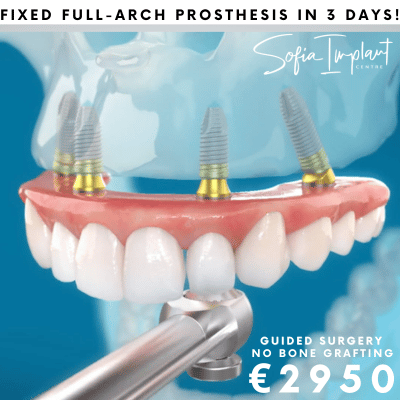Sure, in years to come this will sound strange and ridiculous, but to this date – January 2022, the topic of alternative treatment for COVID-19 is very relevant. You may have heard that you can cure and keep COVID away from you by drinking bleach (Chlorine dioxide)?! Unfortunately, such exotic ideas often grow in society. To us, the topic of basal implants is similar and we have a very strong argument. Let us tell you about it!
If you have seen the post “Implants and lack of bone” you may already know that lack of bone is the main risk factor in an implant surgery. Unlike conventional implants, which we have detailed in another post, basal implants promise trouble-free implantation in places where there is little bone available. Sounds great, right?! – Easy solution to a difficult problem, WOW!
The basal implants were created by a French dentist in 1972. They went through several stages of development by other researchers and found their real application mainly in Eastern European countries in the 1990s.
And since we guess you, just as we, are not experts on basal implants, we decided to look up for verified information on basal implants on the Internet. While researching online, the main load of information streams from clinics that actually offer them. Without any significant success finding a serious and validated scientific information, several questions popped up…
- Why can’t we find anything about “basal implants” on Wikipedia???!!! Wikipedia has information on anything but not basal implants, hmmm!
- It seems that basal implants are not taught anywhere in medical universities! Does this mean that they are not supported by official medical science??? Then how did those doctors who offer them gained their skills???
- Why aren’t basal implants FDA certified in the USA and not available there??? Are Americans stupid??? Try yourself – open a browser and look for an implant clinic you want in any US state – you would not find basal implants on offer anywhere in the US.
- Why don’t serious implant manufacturers like Straumann offer such implants??? Maybe they are bothered by something?
We know that these questions will provoke a wave of furious comments from the creative marketers of basal implants and we will receive proofs of how effective they are, how many patients have been successfully treated, etc.… But this is exactly what we aim at: to open a discussion by getting answers on these 4 questions in advance. That’s why we have left the discussion under the post open. Until we get adequate answers to these 4 questions, to us, basal implants remain an exotic “solution” (in big quotes) to a major medical problem, such as drinking bleach to treat COVID and other unresolved medical problems.
Related article:
What does quality mean in full-arch restoration?

Our Promise and Guarantee
We treat every patient with respect, responsibility and professionalism.
All our reconstruction works carry a 5-year guarantee subject to proper post-treatment care. All implants have a lifetime structural guarantee.
Get your free individual treatment plan today!
Get your free individual treatment plan today!
Related posts and videos:
 What quality to expect from Sofia Implant Centre. Materials used, services & work standards.
What quality to expect from Sofia Implant Centre. Materials used, services & work standards.
 Your Biggest Risk in Dental Implantation
Your Biggest Risk in Dental Implantation
 What is a dental implant?
What is a dental implant?
 Are dental implants right for me?
Are dental implants right for me?
 How to choose the best implants on the market?
How to choose the best implants on the market?
 CBCT (3D) Scan – Why Is It Important?
CBCT (3D) Scan – Why Is It Important?
 Extraction of teeth and placement of implants
Extraction of teeth and placement of implants
 Implants and lack of jawbone
Implants and lack of jawbone
 What is All-on-4 and All-on-6 complete dental restoration?
What is All-on-4 and All-on-6 complete dental restoration?
 The three most important things for successful treatment by the ALL-ON-4/6 protocol?
The three most important things for successful treatment by the ALL-ON-4/6 protocol?
 ZIRCONIUM and … zirconium.
ZIRCONIUM and … zirconium.
 Why the modern dental laboratory is so important?
Why the modern dental laboratory is so important?
 Surgical guides for dental implants – why is it so important?
Surgical guides for dental implants – why is it so important?
 Why getting an implant passport is a must?
Why getting an implant passport is a must?
 Classic or basal implants
Classic or basal implants
 Bite registration for complete dental restorations.
Bite registration for complete dental restorations.